zesty neuroqueer disabled rec therapist may add or detract more later
Don't wanna be here? Send us removal request.
Text
I'm not sure if I've heard of Anne Carson before... maybe? But o wow. Gonna go explore.
do you guys even know what anne carson is like. you reblog her quotes all the time but are you aware that seeing her in person is a spiritual experience
#into the rabbithole#washing away gender and genre#thanks commenter who shared the youtube video!#anne carson
31K notes
·
View notes
Text
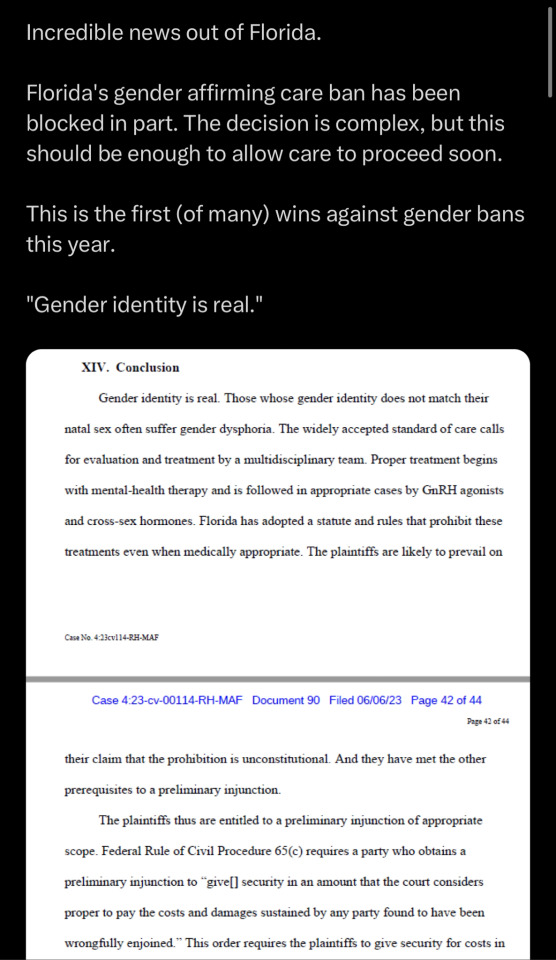
HELLO CAN YOU GUYS HEAR ME!!!!! "GENDER IDENTITY IS REAL"
25K notes
·
View notes
Text
Need to add my dear friend narcolepsy, which has hypnagogic and hypnapompic hallucinations
babygirl I'm bothered by noises you wouldn't even hear
133K notes
·
View notes
Note
Ok so I like boys and I might be a trans dude but I’m really attracted to the lesbian label idk why but aaa isnsuhsuwnsus Idk what to do what is wrong with me please help me
I have the same problem with the term ‘butch’, I really like it but I’m not a lesbian so I can’t exactly use it
so instead I just call myself a sparrow stag (meaning a sorta low-maintenance masculine nb)
59K notes
·
View notes
Text
i don't want to be angry any more. let's look at prairie gardens and tapestry lawns :)
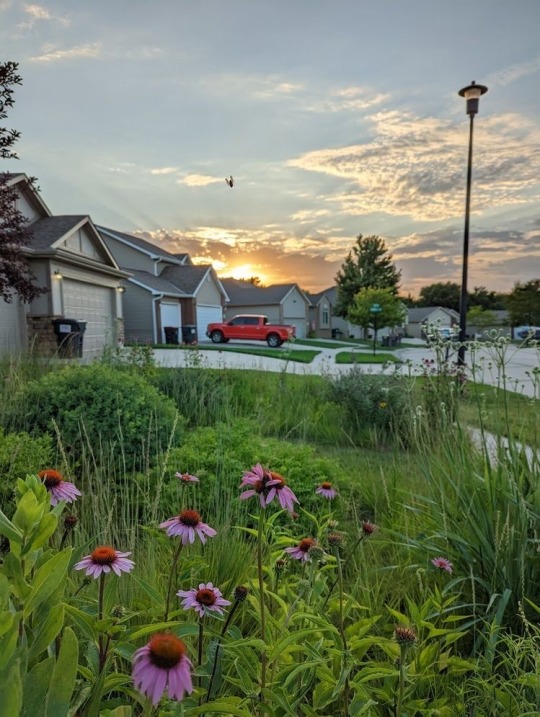

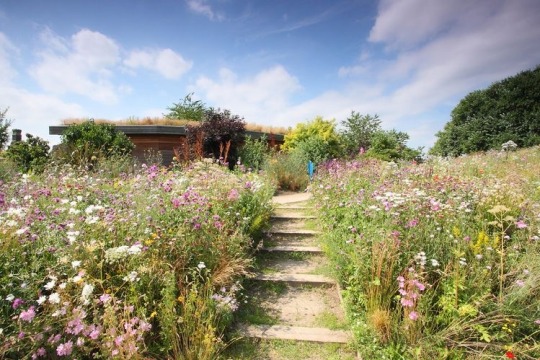



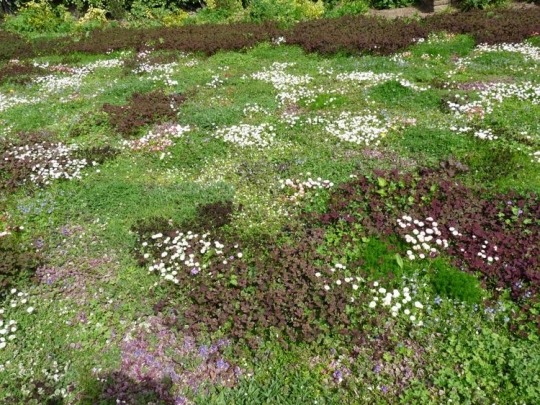


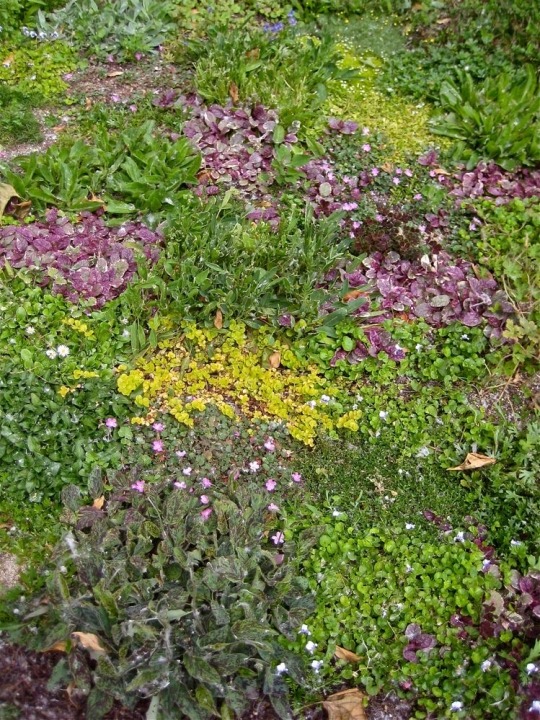
don't cry, future is beautiful
6K notes
·
View notes
Text
the uncommon allergy haver to anticapitalist pipeline
46K notes
·
View notes
Text
#more language is more better
art tips
don't call what you create "content". regardless of what it is. that's the devil talking. call it art, call it writing, call it music, call it analysis, call it editing, literally just call it what it is
I was going to put other things but oh my god please just don't call yourself a "content creator". you are a person you are making art / writing / music / etc you are an artist an author a musician
you are not an Image Generator For Clicks And Views. please. allow yourself to connect with your work by naming it properly and acknowledging yourself in kind
99K notes
·
View notes
Text
I live in Indiana and growing up I pretty much found everywhere i went to be magical. Buuuut can confirm that Ye Red State Systems got me in my adolescence and I started believing that my state/hometown was a bunch of flat cornfields, boring suburbia yada yada.
<<too much context about my college town being beautiful and close to state/national forests and my brief encounters w these natural splendors probably kept me alive/but i didn't have enough energy to fully immerse bc I was Grinding To Be A Good Helpful Cog>>
Back in hometown and gee wiz I start discovering we have well over a dozen nature preserves scattered among a several-county-area, one of the oldest old growth forests in the state protected and less than hour away, and a bunch of different groups for different aspects of the environment and gardening and people relationships w these and and there's more my brain can't think of but I've just been re-learning the magic of Where I'm At and posts like this and the other one OP shared about the research on kudzu apparently bubbles of a bunch of connections for me
it is pretty disappointing to read about conservation efforts in the USA vs. many countries in, say, Africa or many tropical regions of the globe, because it feels like Americans really don't appreciate or notice the value of their animals and ecosystems.
It is really ENCOURAGING to see how much progress is made with conservation around the world, but it casts the USA's ecosystems in a sad light. Red states' governments are largely totally indifferent to preserving their ecosystems, even though some of the reddest states have the most biodiverse and globally unique ecosystems. It's individual people organizing that's doing so much of the work
It's like Americans understand why it's important to save lions, tigers, elephants and zebras, but when it comes to cougars, bison, wapiti and wolves, it's like "Ehhhhh" and caring about them at all makes you a liberal commie.
anyway it feels like reintroducing wolves, bison etc. to historical parts of their range should be more of a priority and it's not and it makes me sad
#dumping my resonances and connections#not so related to the original post but kinda#actually like where i live altho of course has its share of shit and probs
2K notes
·
View notes
Text
As someone living in the very conservative/rust belt midwest state they grew up in, and raised on a lot of country music, this is v exciting
discovering the queer country scene has honestly been so healing because most queer musicians i've seen recommended for years i just couldn't really connect with because it wasn't the sort of music i listened to or had investment in and with queer country it's like. yes. this is the language i speak in. this is Fuck You, I Belong Here Too, not just as a queer person in the country but as a rural person among (sub)urban queers, and saying it with a laugh. when will my hometown take pride in me, goddamn it
27K notes
·
View notes
Text
*ponders* is this (at least 1 branch of) why I Like The 'Like' Button so much? Bc when I traverse the wilds of social media [hell, even my 'scrolling' is slow bc I will follow every link in an article, check out at least half the references or tags on an Interesting Post, savor it like a slow sipped tea...], I often feel like a switchboard that will have various buttons start twinkling like stars that indicates RESONANCE !CONNECTION ! RELATED !. But. I don't have human language for it yet. I just know it's there, but predictably it will be hours/days/ weeks or more before I have a eureka rootline to articulate how & what & why. [Context: I've already iterated this concept a number of times which is probably why I'm able to throw words on to this reblog but not hashtags bc they still boggle me a bit here...]
As per usual, I was talking to a client this week about autistic cognitive processing and I felt the sand shifting under my feet. So I come here to you Tumblr to do my own autistic cognitive processing in the hopes of better serving myself and my clients.
I have known for a long time that I can't process my thoughts and emotions verbally. This is what sometimes leads to me getting frustrated, "stuck," and increasingly pressurized towards my meltdown threshhold when I'm trying to express a half-formed thought or need. This is why I often choose to process my cognition in writing. It allows me to sift about in the sands of my mind, sliding to and fro, checking and rechecking, until I find what I need.
There is something to the capacity to shape my communication more freely and without the preesure that I put myself under which often leads to stammering, stuttering, aphasia, confusion, and my inability to hold something as ephemeral as language in my head long enough to manipulate it like clay with my hands. Words are not my brain's mother tongue in the first place, and it can be a welcome relief to truly take the slowed pace I need to translate my thoughts into a language others will understand.
Some others. I am well aware of who I learned my translation process from and of how that has made my translations inaccessible to some of the very people who share my brain.
The thing is, to learn to speak at all when your brain processes this slowly takes enormous effort. To learn to CHANGE your speech is back breaking. I have been trying for fifteen years.
Autistic cognitive processing pace and the disabling ramifications aren't things we talk about often. It's one reason some of us become obsessed with having back up plan upon back up plan (because we literally cannot think fast enough to keep up with the demands of our lives). It's one of the fastest paths to burnouts and meltdowns. It's part of why we are unable to keep up with the demands of social interactions, especially in large groups (too many social cues moving too quickly to be processed at pace and we drop the ball in the moment even if we realize later).
Because the pace of our cognition is chronically slowed, we are chronically disabled socially, emotionally, cognitively, etc, and we are forced to spend an incredible amount of mental and physical energy either compensating for that, recovering from it, or both. That is energy and resources neurotypical people get to spend on other things in their lives, maybe a project or hobby, a relationship, hell, just relaxing.
There can be upsides to it. This slowed cognition seems to be related to how the process of bottom-up analysis functions during cognitive processes in Autistic folks' brains. That bottom-up analysis is a really interesting cognitive processing style that seems to be responsible for increased pattern recognition! So a lot of how we're able to analyze, learn, understand, mimic, etc based on pattern recognition is thanks to this processing style. It helps us take in a holisticly detail oriented view of the things we look at, which can (with support) make us great researchers, investigative journalists, and inventers.
But while the upsides have become more discussed as we've become more willing to see Autism itself as neutral (a very good thing in my opinion), we sometimes forget the other side of the coin.
I often find myself trying to brute force my way through my processing pace. It always ends badly. And that's really the trouble. I can talk most of the time, but I can talk A LOT faster than I can process my thoughts. So most of the time my words are just. Garbage. Sounds. If you ask my to speak to you, you are asking me to fill up soundwaves because realistically my brain moves at about 25% of the speed of the conversation.
It's why as a clinician I have to be so incredibly careful what I do and say and how I hear my clients because I *truly* am processing what the tell me at auch a significant delay. It can sometimes be days later when the information truly settles into place.
The same is obviously true in my personal life! It can take me days or even weeks to figure out what a single thought or feeling means in the context of my own life because I have to process that often entirely alone or just on paper. Not because no on one WOULD help me I have people in my life who would be willing but because by the time talking to someone would be any help, I would have basically figured it out enough to just say it out loud and I don't really need their help by then. There are rare exceptions to this when I do definitely seek help but it can be so frustrating to be trapped, voiceless, in your own emotions.
I don't have a framework for this, only the suggestion to embrace the slowness. I have found that when you are not constantly fighting against it all the time, it feels a little more like home, a little more like it's working FOR your instead of AGAINST you.
202 notes
·
View notes
Text
Y'all ever get so excited about a scientific paper you're reading that you get chills???
So I thought to myself
Huh, a lot of our invasive species come from China and Japan
And then I thought, huh, I should look up what Kudzu is like in its natural habitat
And I found this article by a team of scientists investigating the history of Kudzu in China
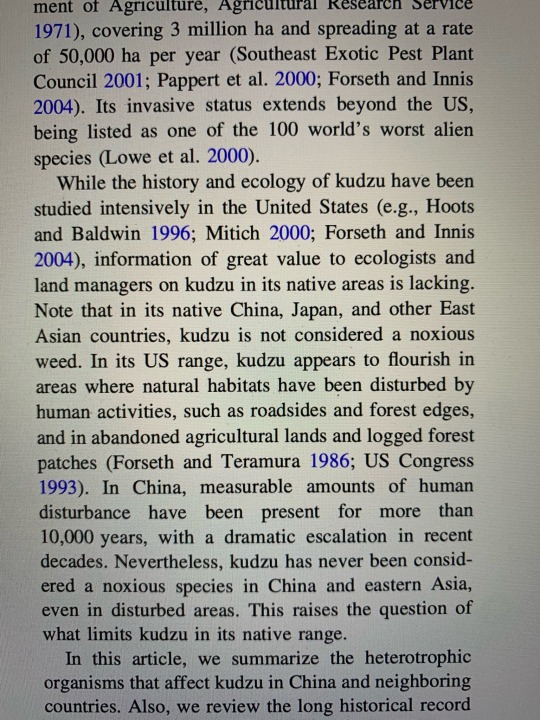
And ohhhhh my goddddd. I'm vibrating with excitement over how cool this is.
The first bombshell that turned my brain inside out:
KUDZU IS NOT WILD. IT IS SEMI-DOMESTICATED.
In China, Kudzu has been a fundamentally important plant for food and textiles throughout history. We have Kudzu cloth that is 6,000 years old!


THIS PLANT CLOTHED AND FED ONE OF THE MOST POPULOUS AND MOST ENDURING HUMAN CULTURES ON EARTH
and in turn
HUMANS SHAPED AND SELECTED FOR ITS TRAITS
*AND*
in its natural range, humans are the main "predator" of kudzu

"Harvest by humans appears to be the major control mechanism in its native areas."
Kudzu is like that because it co-evolved with humans.
WHAT
24K notes
·
View notes
Text
This reminds me of Theater of War productions (https://theaterofwar.com/), I’d love to hear (at least part) of this read/performed
Throughout her translation of the “Odyssey,” Wilson has made small but, it turns out, radical changes to the way many key scenes of the epic are presented — “radical” in that, in 400 years of versions of the poem, no translator has made the kinds of alterations Wilson has, changes that go to truing a text that, as she says, has through translation accumulated distortions that affect the way even scholars who read Greek discuss the original. These changes seem, at each turn, to ask us to appreciate the gravity of the events that are unfolding, the human cost of differences of mind.
The first of these changes is in the very first line. You might be inclined to suppose that, over the course of nearly half a millennium, we must have reached a consensus on the English equivalent for an old Greek word, polytropos. But to consult Wilson’s 60 some predecessors, living and dead, is to find that consensus has been hard to come by…
Of the 60 or so answers to the polytropos question to date, the 36 given above [which I cut because there were a lot] couldn’t be less uniform (the two dozen I omit repeat, with minor variations, earlier solutions); what unites them is that their translators largely ignore the ambiguity built into the word they’re translating. Most opt for straightforward assertions of Odysseus’s nature, descriptions running from the positive (crafty, sagacious, versatile) to the negative (shifty, restless, cunning). Only Norgate (“of many a turn”) and Cook (“of many turns”) preserve the Greek roots as Wilson describes them — poly(“many”), tropos (“turn”) — answers that, if you produced them as a student of classics, much of whose education is spent translating Greek and Latin and being marked correct or incorrect based on your knowledge of the dictionary definitions, would earn you an A. But to the modern English reader who does not know Greek, does “a man of many turns” suggest the doubleness of the original word — a man who is either supremely in control of his life or who has lost control of it? Of the existing translations, it seems to me that none get across to a reader without Greek the open question that, in fact, is the opening question of the “Odyssey,” one embedded in the fifth word in its first line: What sort of man is Odysseus?
“I wanted there to be a sense,” Wilson told me, that “maybe there is something wrong with this guy. You want to have a sense of anxiety about this character, and that there are going to be layers we see unfolded. We don’t quite know what the layers are yet. So I wanted the reader to be told: be on the lookout for a text that’s not going to be interpretively straightforward.”
Here is how Wilson’s “Odyssey” begins. Her fifth word is also her solution to the Greek poem’s fifth word — to polytropos:
Tell me about a complicated man. Muse, tell me how he wandered and was lost when he had wrecked the holy town of Troy, and where he went, and who he met, the pain he suffered in the storms at sea, and how he worked to save his life and bring his men back home. He failed to keep them safe; poor fools, they ate the Sun God’s cattle, and the god kept them from home. Now goddess, child of Zeus, tell the old story for our modern times. Find the beginning.
When I first read these lines early this summer in The Paris Review, which published an excerpt, I was floored. I’d never read an “Odyssey” that sounded like this. It had such directness, the lines feeling not as if they were being fed into iambic pentameter because of some strategic decision but because the meter was a natural mode for its speaker. The subtle sewing through of the fittingly wavelike W-words in the first half (“wandered … wrecked … where … worked”) and the stormy S-words that knit together the second half, marrying the waves to the storm in which this man will suffer, made the terse injunctions to the muse that frame this prologue to the poem (“Tell me about …” and “Find the beginning”) seem as if they might actually answer the puzzle posed by Homer’s polytropos and Odysseus’s complicated nature.
Complicated: the brilliance of Wilson’s choice is, in part, its seeming straightforwardness. But no less than that of polytropos, the etymology of “complicated” is revealing. From the Latin verb complicare, it means “to fold together.” No, we don’t think of that root when we call someone complicated, but it’s what we mean: that they’re compound, several things folded into one, difficult to unravel, pull apart, understand.
“It feels,” I told Wilson, “with your choice of ‘complicated,’ that you planted a flag.”
“It is a flag,” she said.
“It says, ‘Guess what?’ — ”
“ ‘ — this is different.’ ”
The First Woman to Translate the Odyssey Into English, Wyatt Mason
36K notes
·
View notes
Note
A post in a facebook group I’m in for ND in recreation therapy/therapeutic recreation reminded me of this as an IG post, which then led me to the tumblr post, thus reminding me I have a tumblr, and since its ‘national recreation therapy month’ I want to share this, but I also have have-baked comments on how [autistic] therapist could be extended/exchanged with [disabled/chronically ill] therapist (which I also identify as) ... so until/if this comes out the oven in its own time, this reblog will ~be enough~
Hey newly-realized Autistic here.
I’m trying to find an Autistic therapist!
Which is hella hard. There are tons of Allistic people that know about Autism and want to help me, but the communication differences alone would be too much to actually delve into the issues I need help with. I’ve been seeing Allistic therapists for yearsss, long before I realized I was Autistic. And it doesn’t work very well! But most places like TherapyDen don’t have a good way to search for stuff like that, just Allistic people with training in Autism. Any ideas??
You may have seen a post I made a week or two back about how difficult it is for a therapist to be openly Autistic. The systematic discrimination against Autistic people in mental health is why you’re having a hard time finding a good provider right now. Very few Autistic people get to be therapists under our current system, and nearly all those who do exist cannot safely be “out”.
Autistic people and people who are open about having mental illnesses and disabilities are pervasively excluded from psychology and psychiatry, because those fields dehumanize us as part of how they function. what that means is that while there are a growing percentage of great Autistic therapists out there, they are very hard to find. Doing a search for an out Autistic therapist usually will not work, because most of them have to be closeted in order to have a career and maintain licensure.
This also means some of the allistic therapists you might have looked past right now are actually Autistic themselves, but not free to openly identify as such.
In order to vet a potential therapist and find one that is Autism-competent, you will have to ask more specific and measured questions, rather than just filtering for an Autistic practitioner. I think more therapy patients should get in the habit of grilling their potential providers in general. How comfortable a therapist is answering questions and explaining their process can be quite telling about their relationship to authority and their respect for patient self-advocacy in general.
When you are first emailing with a therapist or inquiring about future appointments on the phone, ask them questions like this:
Do you have experience working with adult Autistic patients?
What, in your view, are some of the biggest struggles that Autistic patients typically face? (if they mention external and systemic factors like ableism or capitalism, these are good signs -- if they mention inherent deficits that Autistics supposedly have, not so much)
Have you worked with masked Autistic patients before, and what is your understanding of what masking is and what unique therapeutic challenges it presents?
What are some of the unique struggles, in your experience, that queer Autistic patients face? What about Autistic people of color? Or Autistic women?
Are you familiar with the concept of neurodiversity, and how does it inform your therapeutic practice?
What are some ways that non-Autistic therapists commonly fail their Autistic patients, and what are some steps you’ve taken to avoid doing that kind of harm?
Every therapist has limitations, blindspots, and areas where they should continue growing their knowledge. Where do you think you still have room to grow?
A good therapist will have answers to all of these questions and won't be defensive about being asked them. If a provider is well equipped to address questions like these, the odds are good that they are in some way neurodivergent themselves and have done the inner work necessary to be a solid provider to their ND patients. Being an Autistic therapist, after all, is not enough. Identity does not absolve someone from having absorbed a lot of damaging societal shit -- and ableism is baked into how all therapists are trained. So honestly I'd recommend asking questions like these even if you did know for a fact that a provider was Autistic. And since you usually won't get to know that, these questions will get to the heart of the issue a bit indirectly.
I would love it if anyone else who has found an Autism-competent therapist would share any questions they used to vet potential providers in the replies.
#actually neurodivergent#actually autistic#disabled#disabled therapist#neurodivergent therapist#recreation therapy#therapeutic recreation#RecTherapyMonth#recreation therapist#chronically ill
72 notes
·
View notes
Text
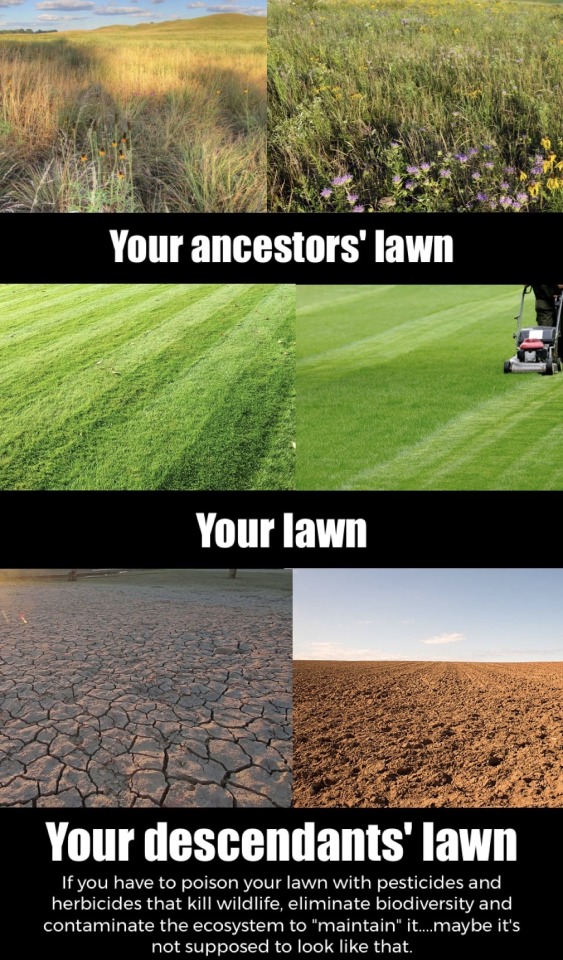

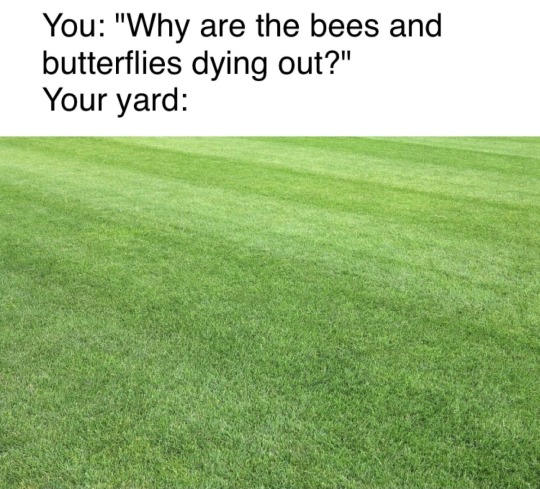

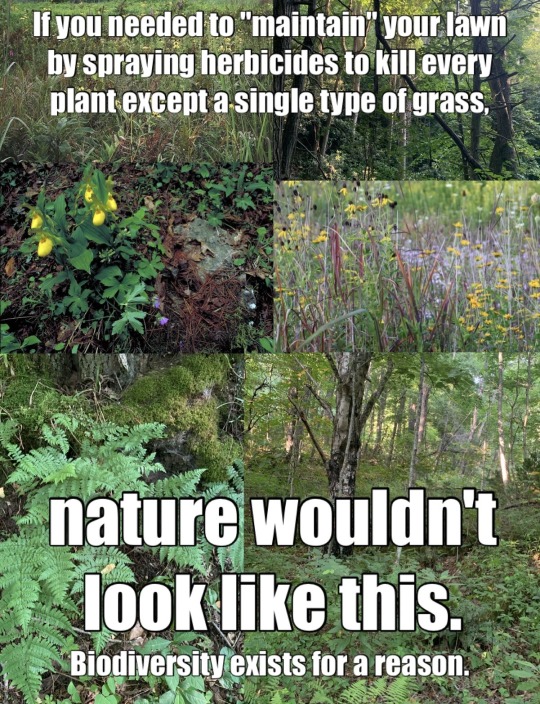

i need y'all to steal and repost my anti-lawn memes to as many pinterest boards and facebook pages as possible
133K notes
·
View notes
Text
absolutely true.
Long story but I barely lasted a month working in-patient psych before "being let go". This was pre-neurodivergent/queer awareness, but was already a chronically ill therapist and the burnout was that fast
and here is the thing. all psych wards are bad. every single one. I don’t think there is such a thing as a good psych ward—I’m willing to believe that there are some good people who work in psych wards, who have good intentions, and who might end up helping some people. but the psych ward as a whole? There are no good psych wards. The structure of a psych ward inherently prevents it from being good. Even if you personally think you had a good experience in a psych ward, most likely what that means is that the abusive practices weren’t used on you. But those things are still there. even if you weren’t put into solitary confinement, it is extremely likely that your psych ward still had a room for that. even if you weren’t drugged without your consent, it is very likely other people were being drugged without consent!! even if you weren’t strip searched, or tied to your bed, or starved…it is VERY likely that your psych ward has protocols for all these things and regularly does them to many people who come through the ward! And it is vital to think about how your race, class, and other identities affected your experience before making broad claims about things “never happening” in psych wards.
Psych wards are inherently violent, oppressive, and unethical based solely on the fact that they are a form of incarceration, but even beyond that? If a psych ward is committed to enforcing compliance and incarceration, it is going to have some of those abusive measures that I listed above, and that is going to be standard protocol. Even if there are good people working in a psych ward, their reach is going to be limited—the power of the institution means that they constantly have to weigh the decision to break the rules and help someone, or to follow violent protocols. Most clinicians and staff will choose not to lose their job and even if they find it personally distasteful, will still choose to enable these types of violence. Good people on the inside are not able to fundamentally change the reality of what psych wards are and what they can do.
I strongly believe that people who say they have good experiences are the outlier and also are likely to be white and rich. Even if people don’t think that their experience was abusive, a lot of people generally find it boring, unhelpful, and mediocre. And so, so many people are experiencing abuse in a daily fucking basis in these places. Even if there are individuals who manage to escape the worst of a psych ward, the fact that the psych ward has the power, structure, and protocol to do these things to anyone is a problem.
9K notes
·
View notes
Text
This is my pup, frequently
I love it when dogs try to help but the task at hand requires zero dogs so they just kinda stand in front of you and look serious.
261K notes
·
View notes
